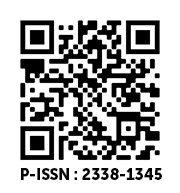Assessing the climate change and its impact on livelihoods of smallholder farmers in Karaga district of Ghana
DOI:
https://doi.org/10.36782/apjsafe.v13i1.490Keywords:
smallholder farmers, Levelihoods, Climate change, Adaptation, Mitigation, Greenhouse gasesAbstract
Agricultural production and food security among smallholder farmers has been threatened as a results of the effect of the changing climate. This study sought to analyse the changing climate and its impact on livelihoods among smallholder rural farmers in the Karaga district of Ghana. The research adopted a mixed-method approach where both quantitative and qualitative data were used. Primary data was obtained from 272 households through interviews, focus group discussions, field observation, and key informant interviews. The findings show that majority of farmers recognize the negative effects of climate change on their livelihoods. Farmers also perceive potential benefits from new technologies such as high-yielding varieties and irrigation that can enhance their well-being. Smallholders also confirmed that the adaptation and mitigation strategies were through indigenous weather forecasting, and bio-insecticides innovations. In the years of crop failure because of climate hazards, smallholder farmers resort to trading, firewood harvesting for sale and charcoal burning as a coping livelihood strategy. The research also reveals that there is no significant differences between gender and adaptation response to the changing climate. The study further reveals that women and children are the most vulnerable during climate-related displacements. In conclusion, the ancient traditional practices of smallholder farmers, such as the use of ‘rain callers’, the use of forest reserves as shrines, indigenous weather forecasting, and the use of bio-insecticide innovation, are still very relevant in adapting to climate variability. The research recommends the promotion of indigenous weather information systems and sustainable agricultural practices to build rural smallholders' capacity to adapt.
Downloads
References
Acheampong, P. P., E. A. Obeng, M. Opoku, L. Brobbey and B. Sakyiamah, 2022. Does food security exist among farm households? Evidence from Ghana. Published in April 2022. https://doi.org/10.1186/s40066-022-00362-9.
Bell, J., 1993. Doing Your Research Project: A Guide for First-time Researchers in Education and Social Science, 1st Edn., Open University Press, UK., ISBN-10: 0335190944, pp: 176.
Bisht, N. and P.S. Chauhan, 2020. Excessive and disproportionate use of chemicals cause soil contamination and nutritional stress. Published: December 16th, 2020. IntechOpen DOI: 10.5772/intechopen.94593.
Codjoe S. N. A. and D.Y. Atiglo, 2020. The implications of extreme weather events for attaining the sustainable development goals in sub-saharan africa. Frontiers in Climate Volume 2. DOI=10.3389/fclim.2020.592658.
Creswell, J. W., V.L. Plano Clark, M. Gutmann and W. Hanson, 2003. Advanced mixed methods research designs. In Tashakkori, A. and C. Teddlie (Eds.), Handbook of mixed methods in social and behavioural research (pp. 209–240). Thousand Oaks, CA: Sage.
Davis, B., P. Winters, G. Carletto, K. Covarrubias, E.J. Quiñones, A. Zezza, and S. DiGiuseppe, 2010a. A cross-country comparison of rural income generating activities. World Dev 38(1):48–63. http:// doi.org/10.1016/j.worlddev.2009.01.003.
Davis, J. R., S. Wilson, A. Brock-Martin, S. Glover, and E.R. Svendsen, 2010b. The impact of disasters on populations with health and health care disparities. Disaster Med Public Health Preparedness 4 (1):30–38. http://doi.org/10.1017/S1935789300002391.
Dube, T. and K. Phiri, 2013. Rural livelihoods under stress: The impact of climate change on livelihoods in South Western Zimbabwe, American International Journal of Contemporary Research, 3(5): 11-25. https://www.ccardesa.org/knowledge-products/rural-livelihoods-under-stress-impact-climate-change-livelihoods-south-western.
Echebiri, R., C. Onwusiribe, and D. Nwaogu, 2017. Effect of livelihood diversification on food security status of rural farm households in abia state nigeria. Scientific Papers Series Management, Economic Engineering in Agriculture and Rural Development 17(1):159-166.
Farmer, G.T. and J. Cook, 2013. Climate change science: A modern synthesis; Volume 1-The Physical Climate, Springer Science+Business Media Dordrecht 2013.
Fiasorgbor, D., E. Wiafe, C. Tettey, and M. Abasiyam, 2018. Assessment of the coping strategies of flood victims in the Builsa District. Semantic scholar. https://doi.org/10.11648/J.AJESE.20180201.12.
FAO, 2020. The state of food and agriculture 2020. Overcoming water challenges in agriculture. Food and Agriculture Organization, Rome, Italy, FAO. ISBN 978-92-5-133441-6 https://doi.org/10.4060/cb1447en.
FAO, 2015. Why gender: Key facts. Rome: Food and Agricultural Organization of the United Nations. Retrieved on 20/02/2022 at: http:// www.fao.org/gender/gender-home/gender-why/key-facts.
Gecho, Y., 2017. Rural farm households; income diversification: The case of Wolaita zone, Southern Ethiopia. Social Sciences 6(2):45- 56. doi: 10.11648/j.ss.20170602.12.
NC4, 2020. National climate change report 202. Environmental Protection Agency. Ghana Fourth National Communication (NC4) to the United Nation Framework Convention on Climate Change. Retrieved on 20/10/2021 www.epa.gov.gh.
GSS, 2021. Ghana 2021 population and housing census Volume 3A; population of regions and districts. Ghana Statistical Service, Accra, Ghana. https://statsghana.gov.gh/gssmain/fileUpload/pressrelease/2021%20PHC%20General%20Report%20Vol%203A_Population%20of%20Regions%20and%20Districts_181121.pdf
IPCC, 2021. Summary for policymakers. Climate Change 2021, The physical science basis. Contribution of Working Group I to the sixth assessment report of the Intergovernmental Panel on Climate Change. Cambridge University Press. In Press.
IPCC, 2019. Managing the risks of extreme events and disasters to advance climate change adaptation. Special report of the Intergovernmental Panel on Climate Change. Cambridge University Press 32 Avenue of the Americas, New York, NY 10013-2473, USA2019. ISBN 978-1-107-02506-6 Hardback ISBN 978-1-107-60780-4 Paperback
IPCC, 2007. Climate Change 2007: Impacts, adaptation and vulnerability. Contribution of Working Group II to the fourth assessment report of the Intergovernmental Panel on Climate Change. [Core Writing Team, Pachauri, R.K and A. Reisinger, (eds.)]. IPCC, Geneva, Switzerland, 104 pp.
IPCC, 2001. Intergovernmental Panel on Climate Change. The scientific basis. Contribution of working Group I to the third assessment report, Annex B: Glossary of Terms.
Kaunza-nu-dem, K.M., A. Joseph, and A. Philip, 2021. Climate livelihoods and people of the Kassena Nankana Municipal and the Bongo District of Ghana. ISNB: 978-99988-3-0347-1.
Kim, C.G., S.M. Lee, H.K. Jeong, J.K. Jang, Y.H. Kim and C.K. Lee, 2010. Impacts of climate change on Korean agriculture and its counterstrategies. Research Report No. 593. Korea Rural Economic Institute.
Maddux, J.E. and B.A. Winstead, 2019. Psychopathology: Foundations for a Contemporary Understanding. Routledge. ISBN 978-0-429-64787-1. Archived from the original on 4 August 2021.
Mari, G.R., C. Ji and Z. Jun, 2008. Effects of soil compaction on soil physical properties and nitrogen, phosphorus, potassium uptake in wheat plants. J. Transactions of the CSAE, 24(1): 74-79. https://doi.org/10.1007/s42853-021-00117-7.
MFA, 2019. Ghana climate change profile. Published by the Ministry of Foreign Affairs of the Netherlands. Government of Ghana April 2019.
Mphande, F.A., 2016. Infectious Diseases and Rural Livelihood in Developing Countries. Published by Springer Science Business Media Singapore 2016.
Odonkor, S.T., D.E. Nene and A.M. Sallar, 2020. Knowledge, attitude and adaptation to climate change in Ghana. Hindawi the scientific journal. 2020,3167317,9 https://doi.org/10.1155/2020/3167317.
PHC, 2021. The 2021 Population and Housing Census (PHC) reports: Analysis of district data and implications for planning. Published by the Ghana Statistical Service, Accra, Ghana.
Pranab, D., K.J. Sunil, and S. Katarina, 2022. A qualitative study on gender inequality and gender-based violence in Nepal. BMC Public Health volume 22, Article number: 2005 (2022).
Prowse, M., 2015. The Determinants of Non-Farm Income Diversification in Rural Ethiopia. Journal of Poverty Alleviation and International Development 6(1):109-130. http://jpaid.yonsei.ac.kr/
UNFCCC, 2016. The Paris agreement. Report on the Conference of the Parties, at its 21st session, adopted the Paris Agreement on 12 December 2015. Design and print: Phoenix Design Aid, Denmark. https://unfccc.int › parisagreement_publication.
UNHCR, 2020. Gender, displacement, and climate change. United Nations High Commission for Refugees. https://www.unhcr.org.
UNISDR, 2009. Terminology: Basic terms of disaster risk reduction. United Nations International Strategy for Disaster Reduction. https://www.undrr.org.
WEF, 2021. Global climate risk index; who suffer most from extreme weather events? Weather related loss event 2019 and 2000-2019. World Economic Forum. Published by Germanwatch e.V.
Yamane, T., 1967. Statistics, an introductory analysis, 2nd ed., New York: harper and row.
Yiran, G.A. and L.C. Stringer, 2016. Spatio-temporal analyses of impacts of multiple climatic hazards in a savannah ecosystem of Ghana. Clim. Risk Manage. 14: 11–26. https://doi.org/10.1016/j.crm.2016.09.003.
Downloads
Published
How to Cite
Issue
Section
License
Copyright (c) 2025 Alhassan Bawa

This work is licensed under a Creative Commons Attribution 4.0 International License.








